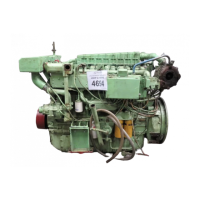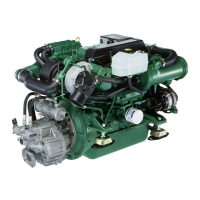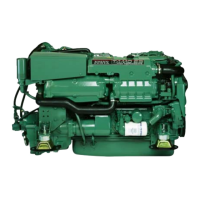Do you have a question about the Volvo Penta TAMD122A and is the answer not in the manual?
Rules for safe boat operation, handling, and adherence to regulations.
Information on CO risks, symptoms, and prevention methods on boats.
Essential safety guidelines for performing engine maintenance and service.
Warnings and safety advice for hot surfaces, chemicals, systems, and batteries.
Volvo Penta's commitment to environmental protection in engine development and use.
Guidelines for the initial 10 hours of engine operation for proper break-in.
Recommendations for using the correct fuel and oil grades for optimal performance.
Importance of using Volvo Penta original parts and authorized dealers for service.
Requirements for maintenance and service of emission-certified Volvo Penta engines.
Overview of the limited warranty coverage for Volvo Penta marine engines.
Location and importance of engine and transmission identification plates for service.
Overview and component identification for the TAMD103A marine diesel engine.
Overview and component identification for the TAMD122A marine diesel engine.
Overview and component identification for the TAMD122P-A marine diesel engine.
Explanation of various gauges and indicators on the main and auxiliary control panels.
Description of control panel components like sirens, buttons, and switches.
Explanation of warning lamps and their meanings for engine status alerts.
Details on the ignition switch positions (Stop, Ignition, Start) and key code.
Operation and features of the single lever control for shifting and speed.
How to disengage the gear shifting function to control engine speed only.
How to adjust the friction brake for lever control stiffness.
Operation of the dual lever control for shifting and engine speed.
Pre-start checks and procedures, including fuel, seawater, and main switch.
Step-by-step guide for starting the engine using the starter switch or button.
Procedure for starting the engine using auxiliary batteries safely.
How to check engine instruments and warning displays after starting and during operation.
Understanding warning lamps and acoustic alarms for engine faults.
Recommendations for optimal cruising speed and wide open throttle ranges.
Techniques for safe maneuvering, including gear engagement and pulling away.
Safe procedures for shifting between forward and reverse to prevent damage.
Manual engagement of reverse gear in case of control lever failure.
Managing propeller rotation when the engine is stationary, e.g., during towing.
Operation of accessories like slip valve, disengageable clutch, and pumps.
Procedure for safely stopping the engine using the key switch or stop button.
How to perform an emergency stop using the injection pump lever.
Post-stop checks and actions, including leak checks and closing cocks.
Procedures to protect the engine and systems from freezing during breaks in operation.
Recommendations for engine care during periods of inactivity to prevent corrosion.
Information on the required first service inspection for warranty validation.
Daily checks before first start, including engine, oil, and coolant.
Maintenance tasks to be performed after the first 10 operating hours.
Maintenance tasks to be performed after the first 50 operating hours.
Maintenance tasks to be performed after the first 150 operating hours.
Periodic maintenance for engine oil and oil filter changes.
Maintenance tasks for every 200 operating hours or 12 months.
Maintenance tasks for every 500 operating hours or 12 months.
Maintenance tasks for every 1000 operating hours or 12 months.
Maintenance tasks for every 2000 operating hours.
Maintenance tasks to be performed every 24 months.
Specific maintenance for renovated engines after the first 150 operating hours.
Routine visual inspection of the engine and engine room for potential issues.
Procedure for changing the crankcase ventilation filter.
Steps for checking, adjusting, and changing drive belts on the engine.
Instructions for checking and cleaning the engine air filter for different models.
Guidelines for engine oil change intervals based on operating hours and fuel sulphur content.
Selecting the correct oil viscosity based on ambient temperature.
How to check the engine oil level using the dipstick.
Procedure for filling the engine with oil to the correct level.
Steps for changing the engine oil and oil filter.
Operation of the electric oil bilge pump for draining and filling oil.
Instructions for changing standard and switchable oil filters.
General information on the freshwater cooling system and coolant requirements.
Specifications for water quality when mixing coolant for the system.
How to prepare and use a 50/50 anti-freeze and water mixture for protection.
Using Volvo Penta anti-corrosion agent mixed with water as coolant.
How to check the coolant level in the engine's freshwater cooling system.
Procedures for topping up and filling the cooling system with coolant.
Step-by-step guide for draining the engine's freshwater cooling system.
How to flush the freshwater cooling system before changing coolant.
Instructions for changing the coolant filter, an optional accessory.
Introduction to external cooling systems and their configurations.
Procedure for draining the seawater system to prevent freezing damage.
How to check and replace zinc anodes to prevent galvanic corrosion.
Instructions for inspecting and replacing the seawater pump impeller.
How to check and clean the seawater filter, especially in polluted waters.
Checking the drain hole on the charge air cooler for condensation.
Steps for cleaning the charge air cooler insert and housing.
Procedure for cleaning the heat exchanger insert tubes to maintain cooling efficiency.
How to clean the oil coolers for the engine and reverse gear.
Requirements for fuel compliance with national and international standards.
Precautions regarding fuel delivery pipes to prevent damage and fire hazards.
Procedure for bleeding the fuel system after filter changes or dry tank refills.
Instructions for changing standard fuel filters.
How to change switchable fuel filters while the engine is running.
Checking the fuel pre-filter/water separator and its pressure gauge.
Draining water and contaminants from the fuel pre-filter.
Steps to change filter elements in single or dual fuel pre-filters.
Proper operation of main switch, connections, and fuses for safety.
Guidelines for battery upkeep, including cleaning, charging, and safety.
Safety precautions for welding and proper installation of boat electrical systems.
Identification and location of various electrical components on the engine.
How to check and fill the oil level in the reverse gear.
Procedure for cleaning the oil strainer in the reverse gear.
Steps for changing the oil in the reverse gear.
Instructions for changing the oil filter on ZF (MPM) reverse gears.
Lubrication of the output shaft bearing seal on TwinDisc reverse gears.
How to adjust the disengageable clutch for proper engagement.
Lubrication points for the disengageable clutch mechanism and bearings.
Lubrication procedure for the side-mounted Power Take-Off (PTO) unit.
Checklist and procedures for conserving the engine and equipment for long periods.
Steps to prepare the engine and boat after a period of storage.
Specific procedures for preserving lubricating and fuel systems for extended storage.
Table listing common engine symptoms and their potential causes.
Procedure for starting the engine using auxiliary batteries safely.
Manual engagement of the reverse gear clutch for forward running.
General specifications including engine designation, displacement, and weight.
Technical data for engine oil capacity, pressure, and grade.
Capacity specifications for the engine's cooling system.
Technical details on fuel system injector pump settings.
Technical data for system voltage and battery capacity.
Technical specifications for ZF (MPM) and Twin Disc reverse gears.
Technical specifications for disengageable clutches at the front and rear of the engine.
| Engine Type | Diesel |
|---|---|
| Number of Cylinders | 6 |
| Configuration | Inline |
| Fuel System | Direct injection |
| Cooling System | Freshwater cooled with heat exchanger |
| Aspiration | Turbocharged |











